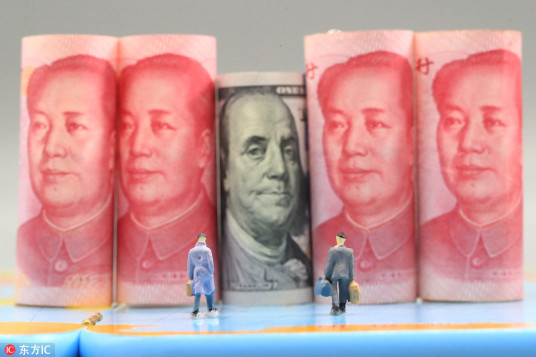Tech firms swear by AI's ability to smarten finance
 |
|
In its latest report on China's financial stability, the People's Bank of China labels these IT giants engaged in financial business as financial holding companies. [Photo/IC] |
BEIJING - China's technology companies have gradually transformed the country's financial sector by incorporating artificial intelligence into their services.
Many top IT companies including Alibaba, Tencent and JD.com have extended their businesses into the financial sector, establishing financial platforms after obtaining several related licenses.
In its latest report on China's financial stability, the People's Bank of China labels these IT giants engaged in financial business as financial holding companies.
Their presence has stimulated the fintech sector and relevant applications in China, especially in terms of investment advisory services, risk management and customer services.
Meng Zhaoli, head of the JD finance research institute, said the standardized products developed by traditional financial institutions could not cater to all of the clients' needs.
"After developing an intelligent investment advisory service, we can find our customers more accurately and provide clients with more customized products," Meng said.
Xu Dongliang, an employee of Du Xiaoman Financial, the financial arm of Baidu.com, said that compared with banks and other traditional financial institutions, his company knew its customers very well.
According to him, each day, Baidu's search engine was used more than six billion times, location engines more than 10 billion times and mobile devices one billion times.
Massive data, therefore, had been generated in real-time, covering a range of spheres and more than 95 percent of Chinese netizens, Xu said.
Through the collection of big data, Du Xiaoman Financial can clearly see the needs of its users and provide financial services to them.
"The services can vary by client and will suit their needs well," Xu said.
As for risk control, Meng Zhaoli said AI-backed risk control tools were more powerful and could easily adapt to different application scenarios.
In addition, the utilization of AI technologies in finance also contributed to efficiency improvement and cost reduction for financial institutions.
After launching finance bots, for instance, Du Xiaoman Financial saw constant improvement in the capabilities of customer acquisition, customer services and debt collection, while the labor costs dropped more than 40 percent, said Zhang Xuyang, vice-president of the company.
Along with the rapid use of financial technologies, almost 1,900 fintech startups were established in China over the past three years, according to a fintech database developed by Tsinghua University's PBC School of Finance.
Meanwhile, the risks brought by utilizing AI technologies in finance should not be neglected, said the PBOC, which unveiled a series of regulations to supervise the emerging services backed by AI.
Exaggerated advertisements are prohibited when utilizing AI, and financial institutions should provide clear transaction procedures and offer manual intervention when algorithm defects appear, according to the central bank.
